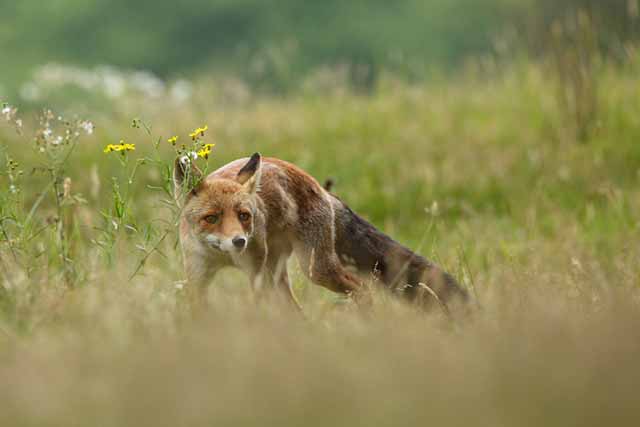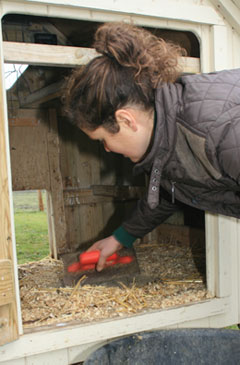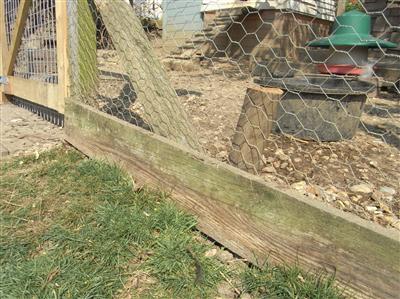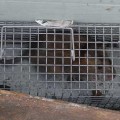Foxes are the number one predator of our chickens in the U.K (unless of course you live on the Isle of Man where there are no foxes!)

Foxes usually rip the heads off chickens and will kill as many birds as they can in a frenzy if they manage to get into a run or coop. Foxes usually get into a run by digging and squeezing under a fence or by going over the top of a fence. Fences need to be buried at least 8 inches deep with the wire then curled flat outwards by another 8 inches. They can clear a 5 foot fence with ease. Remember foxes are more like cats than dogs and can jump!
Foxes can also tear rabbit wire fences with their teeth – it is best to keep fences taught and ideally use the I inch rectangular wire as this is thicker, stronger and they can’t get their teeth into it.
They will squeeze through the smallest of gaps… but don’t take my word for it, this short clip shows him in action!
Foxes usually work alone but towards the end of summer, sometimes the Vixen will hunt with her cubs to teach them.
When are your chickens at risk?
Foxes are generally nocturnal creatures, hunting under the cover of darkness; however when there is a large population of foxes or a shortage of food as is often found in the urban environment, they can start to become a pest during the daytime. Young cubs that are just finding their own food often stay out until mid morning, I frequently see them playing on the bales of hay in the fields near my home in late June and July and from time to time they will come into my garden.
The winter is obviously a dangerous time for chickens when food is short, however the time when most of us get caught out is June to August. Cubs are learning to hunt on their own, will often come early evening or morning when it is light and don’t have the fear to stay away from us.
If your chickens free range, a fox may make a dash, grab a chicken and run off. During these risky times, you may need a small secure run to house them when you are out but there are other options. Electrified poultry netting works wonders at keeping them safe in a large area and you may be able to speak to your local game keeper if you have a problem fox that is very determined.
Do you have any advice on Foxes? Please leave a comment below if you do.






My dog has just got hold of one of my chickens, she is still alive, there is no blood, just a few feathers scattered around. Will she die of shock? what can I do to help her please.
ACV in the water is good for shock but before that you need to establish if there are any puncture wounds.
Glad read this article my girls are surrounded by 5foot fence and there own enclosure thinking they would be ok with height of fence we have but this had made me realise they ain’t cheers 🙂 will be making this better for them so no foxes get to my girls
what veg do chickens like?
Almost anything that we can eat, they can eat. Boil root veg or their peelings as we would.
Hi,
I had 5 chickens free-ranging in an 80×16 foot space. A fox got in and had them all. I want more but dont want to build a small run. I was considering the following two options to keep my birds safe:
1 – Raise the opening of the coop to the roof of the shed, give the birds access via a spindly ladder
or
2 – Build a tunnel into the coop the size of a chicken with a number 180 degree turns close together in it .
Does anyone think either of these options will work?
Thanks,
Steve.
I haven’t tried either. The main problem is the fox can still get them in the run.
I would either re-build your fence so that it is fox proof (6 foot with overhang) or (what I do) is use a triple line electric fence. A wire 6 inches off the floor to stop digging, one at fox nose height and one along the top to stop climbing.
I lost went away for a couple of nights leaving someone in charge of my 4 chickens. The first night they forgot to lock them in the coop and next morning 2 were missing with 2 laying dead outside the run (with their heads on). What could possibly of stretched through a 3″ gap and pulled all 4 chickens back through when they could never get through themselves? I want to get some more chickens but want to make sure the run and coop is predator proof first. Thanks
I don’t quite follow what happend. There are many predators though – not sure where you are in the World but in the UK I would suspect Mink or a Stoat / Weasel.